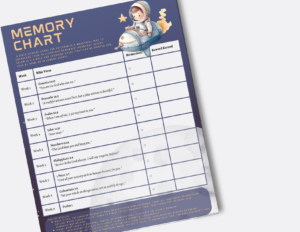Introduction

Storybook Bibles have their place—they simplify biblical narratives with colorful illustrations and age-appropriate language. But there’s an irreplaceable power in children engaging with Scripture itself, even at a young age.
The Bible is living and active (Hebrews 4:12), and the Holy Spirit can illuminate its truths to young hearts in ways we might underestimate. While storybook Bibles are helpful introductions, they should never fully replace the actual Word of God in a child’s spiritual diet.
Here’s why children should read, learn, and memorize Scripture—and how parents can guide them in this journey.
1. The Bible Is Alive—Even for Children
“The word of God is living and active, sharper than any two-edged sword…” — Hebrews 4:12
Unlike storybook adaptations, the Bible is not just about God—it is God’s actual voice to us. Children may not grasp every theological concept, but the Holy Spirit can still speak to them in profound ways. You don’t have to be an adult to hear the Holy Spirit.
Remember when you were a child? Did you ever have special moments with God? Yes, as a child, God’s voice is different to us than as Adults. That is true for every person though. When an adult talks to a child, they speak differently than when addressing other adults. God seeks to call us even from a young age. In Jeremiah we see God called Jeremiah before he was born. Even young Samuel heard the voice of God and was impacted for the rest of His life.
If you want to read more on raising children to be sensitive to God’s voice in their lives and how you can facilitate it, there is a great book by Bill Johnson called, “Raising Giant-Killers: Releasing Your Child’s Divine Destiny through Intentional Parenting“.
How the Holy Spirit Works in Young Readers
- Revelation Over Simplification: A child reading Psalm 23 (“The Lord is my shepherd”) may not understand ancient shepherding, but the Spirit can still stir their heart with God’s care.
- Personal Conviction: A verse like Ephesians 4:32 (“Be kind to one another”) can directly address a child’s behavior in ways a paraphrased story might not. We can even use verses like this to parent in tough situations. Check out
- Lifelong Foundation: Early exposure to Scripture builds discernment—children learn to recognize God’s voice over time.
Parent Tip: When they ask hard questions (e.g., “Why did God flood the earth?”), don’t shy away—use it as a discipleship moment. If you don’t know, there are great resources on the web to research and learn together. This way, not only will they be growing, but you will also be growing in the Lord.
2. Memorizing Scripture Shapes Their Worldview

“I have hidden your word in my heart that I might not sin against you.” — Psalm 119:11
Storybook Bibles summarize; Scripture transforms. Memorization ingrains truth deep into a child’s mind, shaping their thoughts, decisions, and identity.
As they internalize God’s Word, verses like “Do not be conformed to this world, but be transformed by the renewal of your mind” (Romans 12:2) reorient their perspective from secular norms to a Christ-centered lens. This practice equips them to discern right from wrong, resist cultural pressures, and respond to challenges with biblical wisdom—whether facing peer conflict, ethical dilemmas, or moments of fear.
By storing Scripture in their hearts (Psalm 119:11), children develop a “mind of Christ” (1 Corinthians 2:16), enabling them to view life through God’s promises, purposes, and character. Over time, memorized passages act as a “pure river” of truth, continually renewing their understanding of identity, morality, and divine sovereignty, fostering a worldview rooted in eternal hope rather than fleeting trends
Benefits of Scripture Memory for Kids
- Spiritual Armor: When faced with fear, a child recalling “God has not given me a spirit of fear” (2 Timothy 1:7) is equipped in battle.
- Moral Framework: Verses like “Do to others as you would have them do to you” (Luke 6:31) become internalized values.
- Cognitive Growth: Studies show memory work enhances brain development—why not fill it with eternal truth?
Parent Tip: Use songs, games, and repetition (e.g., one verse per week at breakfast).
3. No One Is Too Young for God’s Word
“From infancy you have known the Holy Scriptures, which are able to make you wise for salvation.” — 2 Timothy 3:15
From the moment a child takes their first breath, they are capable of absorbing the love and truth found in God’s Word. The Bible is not just a book for adults; it is a treasure trove of wisdom, stories, and lessons that can shape a child’s heart and mind from an early age. Children possess an innate curiosity and openness that makes them uniquely receptive to spiritual teachings. By introducing them to Scripture through engaging stories, songs, and activities, we lay a strong foundation for their faith journey.
Every verse memorized and every story learned helps instill values of love, kindness, and compassion. When we nurture their understanding of God’s Word, we empower them to grow into resilient individuals who can navigate life’s challenges with faith and grace, proving that no one is ever too young to embrace the transformative power of the Bible.
Timothy learned Scripture as a child—and it led him to faith. We often assume kids need “dumbed-down” faith, but:
Myth: “The Bible Is Too Hard for Kids”
- Truth: Even simple passages (e.g., “Jesus wept”) hold deep meaning. Children understand more than we think.
- Example: A 6-year-old reading “God is love” (1 John 4:8) may not grasp its theological depth, but they canexperience its reality.
Parent Tip: Start with bite-sized reading (e.g., one Proverb a day) and discuss it together.

4. Storybook Bibles Are Helpful—But Not Enough
Storybook Bibles serve a purpose:
✅ Introducing Bible stories in an engaging way
✅ Building familiarity with key figures (David, Moses, Jesus)
But they lack:
❌ The full counsel of God (some stories are omitted or sanitized)
❌ The power of Scripture’s exact words (e.g., Jesus’ own words in red letters)
❌ Opportunities for the Holy Spirit to speak uniquely
Balance: Use storybook Bibles as supplements, not substitutes.
Storybook Bibles can serve as engaging introductions to biblical narratives for young children, offering simplified language and vibrant illustrations that capture their imagination. However, they often prioritize emotional resonance over theological precision, omitting key details or reframing complex truths into moralistic lessons (e.g., reducing the fall in Genesis to a generic lesson on obedience rather than explaining humanity’s brokenness and God’s redemptive plan).
While resources like The Jesus Storybook Bible creatively emphasize God’s love, they risk oversimplifying His holiness, justice, and the fullness of Scripture, potentially leaving children with an incomplete understanding of His character. For lasting spiritual formation, storybook Bibles should complement—not replace—direct engagement with Scripture. Parents and educators are encouraged to pair these tools with age-appropriate Bible reading, guiding children to compare storybook retellings with actual biblical texts to discern accuracy and deepen their faith
5. How to Introduce Kids to the Actual Bible

For Ages 3-6
- Read aloud short verses (e.g., Genesis 1:1, John 3:16).
- Memorize one-line Scriptures with hand motions, and look up memory verse videos on Youtube to follow along with.
For Ages 7-12
- Use a children’s translation (ESV, NIrV) for readability.
- Highlight verses in their own Bible and discuss them.
For Teens
- Encourage personal devotions with a reading plan.
- Teach study methods (e.g., SOAP—Scripture, Observation, Application, Prayer).
Tool Suggestion: Give them a journaling Bible to underline and doodle insights.
Introducing children to the actual Bible—rather than simplified storybooks—requires creativity and intentionality. Start by framing the Bible as God’s personal message, emphasizing its uniqueness. For preschoolers, explain that the Bible is “how God talks to us” and highlight its two main parts (Old and New Testaments) using visual aids like open Bibles or a pile of books where they identify the Bible as special.
For older kids, involve them in active exploration: let them hold their own Bible, teach them to find verses like Genesis 1:1, and use tools like colorful bookmarks or highlighters to engage with the text. Pair readings with interactive discussions, asking questions like “What do we learn about God here?” or “How would you feel if you were in this story?” to deepen understanding and connection.
To sustain interest, blend structure with fun. Do this by, creating a manageable reading plan (e.g., a few verses nightly) and pair it with creative activities: act out stories, draw scenes, or use crafts to visualize lessons (e.g., building boats for Noah’s Ark with craft sticks). For older children, encourage them to lead family Bible time or journal reflections, fostering ownership of their faith journey. Always connect Scripture to the gospel, showing how stories point to Jesus’ love and rescue, even in the Old Testament. By combining reverence for God’s Word with playful engagement, children learn to cherish the Bible as a living, transformative guide—not just a storybook.
Conclusion: Trust the Spirit to Teach Them
Children don’t need to wait until they’re “old enough” to read the Bible—the Holy Spirit can reveal truth to them now. By prioritizing Scripture (not just stories), we:
✔️ Honor God’s Word as primary
✔️ Equip them to hear God’s voice directly
✔️ Build a foundation for lifelong faith
Challenge: This week, read one verse from the actual Bible with your child—then ask, “What do you think God is saying here?” You might be amazed at their response.
“But the Helper, the Holy Spirit… will teach you all things.” — John 14:26
Would you like a printable Scripture memory chart for kids?


